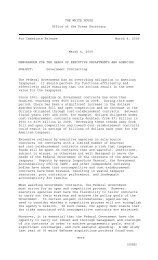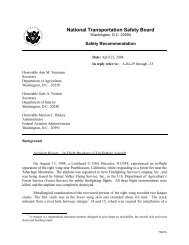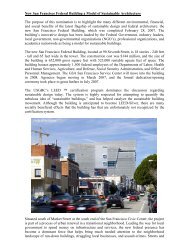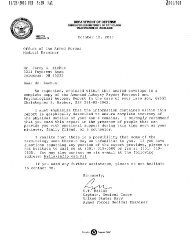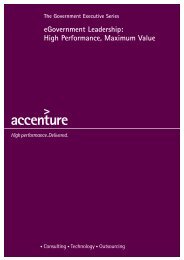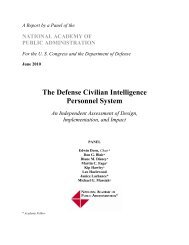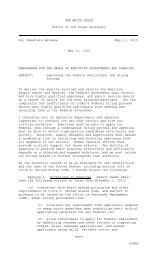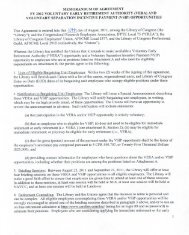Financial Management: Providing a Foundation for Transition - AGA
Financial Management: Providing a Foundation for Transition - AGA
Financial Management: Providing a Foundation for Transition - AGA
- No tags were found...
You also want an ePaper? Increase the reach of your titles
YUMPU automatically turns print PDFs into web optimized ePapers that Google loves.
13The other branch is to reduce work by consolidatingrequirements and the activities theygenerate and by using a more focused approachto compliance reporting and auditing.In the 2007 CFO Survey, 2 we called attentionto the major drain on CFO resources causedby complying with requirements of oversightgroups and Congress. These requirementsspring from the laws and rules shown in thebox “Outside mandates <strong>for</strong> financial in<strong>for</strong>mation.”Many mandates springing from thoselaws and rules are unfunded, so the cost ofcompliance falls on already strained accountingand finance budgets. In the 2007 CFO Survey,executives estimated that they spent one-fourthof their resources in compliance activitiesneeded to meet outside mandates. About halftheir remaining resources went to stewardshipand transaction processing. This left less thanone-fourth of a CFO’s time and resources <strong>for</strong>high-value activities like supporting strategicand program decision making.In 2008, respondents gave us little reason tothink that the situation had changed. Somereported becoming more proficient in writingthe many reports needed to comply with outsiderequirements, ranging from the Per<strong>for</strong>manceand Accountability Report, which includesannual financial statements and per<strong>for</strong>mancemeasures, to improper payments reports requiredby Congress. This saved some resources, but thesavings were consumed as oversight entities andauditors “raised the bar” on requirements.Says an executive, “There is a sense in the federalcommunity that CFOs are not relevant because2Scoring <strong>Financial</strong> <strong>Management</strong> & Oversight Ef<strong>for</strong>ts: the 2007Association of Government Accountants Annual CFO Survey,June 2007.“If compliance requirements are about things that are notimportant to running an entity and they consume a lot of time,then the system is broken.”—An executivethey are consumed with issues that have nothingto do with managing the mission of an entity.If compliance requirements are about thingsthat are not important to running an entity andthey consume a lot of time, then the system isbroken.” Another reports the effect of too muchcompliance work on morale: “As the amount ofcompliance work increases, the government losesone of its most attractive benefits to talentedprofessionals: knowing that you are helping thecountry survive and thrive. Many finance andaccounting professionals think that working oncompliance issues to satisfy outside regulatorsand oversight entities is not as meaningful ashelping to achieve entity missions and the goalsof government, so they leave their entity andsometimes the Federal Government.”Congress is rarely interested in the substantiveissues of accounting or in financial reports, sayseveral respondents, because those topics do notwin many votes from constituents. On the otherhand, according to one executive, governmentfinancial management is a handy political issue,and politics something is either good or bad,nothing in between. As a result, many federalfinancial management bills are not well thoughtout in terms of process, effect or cost/benefit.Executives in our survey had three basic categoriesof suggestions <strong>for</strong> reducing the risk thatoverwhelming compliance activities pose toentities and their CFO components: cost/benefitanalysis, consolidation and risk management.




